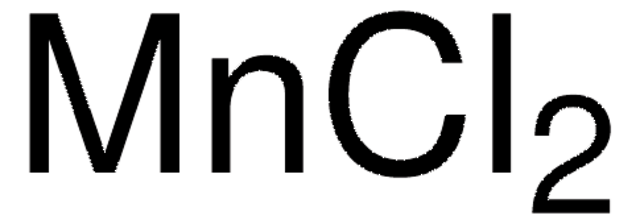M1787
Manganese(II) chloride solution
BioReagent, for molecular biology, storage temp.:room temp
Synonym(s):
Manganese chlroide, Manganese(II) chloride, MnCl2
About This Item
Recommended Products
grade
for molecular biology
Quality Level
sterility
0.2 μm filtered
product line
BioReagent
form
liquid
concentration
1.00 M±0.01 M
cation traces
heavy metals (as Pb): ≤5 ppm
foreign activity
DNase, Exonuclease; NICKase, Endonuclease; and protease, none detected
storage temp.
room temp
SMILES string
Cl[Mn]Cl
InChI
1S/2ClH.Mn/h2*1H;/q;;+2/p-2
InChI key
GLFNIEUTAYBVOC-UHFFFAOYSA-L
Looking for similar products? Visit Product Comparison Guide
General description
Application
- in manganese enhanced magnetic resonance imaging (MEMRI) to study neuronal disease and manganese toxicity
- in high ionic strength reaction mixture to determine RNA polymerase I and II activity
- in reverse transcription reaction mix as a source of Mn2+ ions
Signal Word
Danger
Hazard Statements
Precautionary Statements
Hazard Classifications
Acute Tox. 4 Oral - Eye Dam. 1 - STOT RE 2
Target Organs
Brain
Storage Class Code
12 - Non Combustible Liquids
WGK
WGK 2
Flash Point(F)
Not applicable
Flash Point(C)
Not applicable
Personal Protective Equipment
Certificates of Analysis (COA)
Search for Certificates of Analysis (COA) by entering the products Lot/Batch Number. Lot and Batch Numbers can be found on a product’s label following the words ‘Lot’ or ‘Batch’.
Already Own This Product?
Find documentation for the products that you have recently purchased in the Document Library.
Customers Also Viewed
Our team of scientists has experience in all areas of research including Life Science, Material Science, Chemical Synthesis, Chromatography, Analytical and many others.
Contact Technical Service








